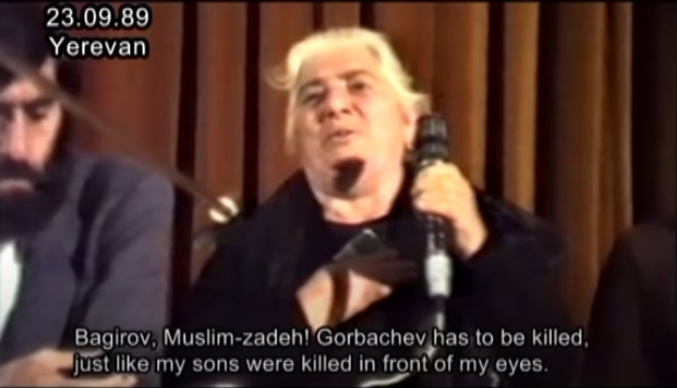By Comrade Harold
A few weeks ago, The Masses published a short article regarding the Azerbaijani invasion of Nagorno-Karabakh and the subsequent ethnic cleansing of the majority Armenian population there, which had established the de facto, but unrecognized, state of Artsakh which persisted for a little over thirty years. We described the events of September in our previous article as “seemingly quite final.” While this is true as far as the state of Artsakh is concerned, it is untrue when considering the development of Azerbaijani nationalism and it’s aspirations toward imperialism manifest in the escelating attacks against Armenia proper.
Nationalism, as Stalin said, “belongs to… the epoch of rising capitalism.” We know that capitalism when fully developed becomes imperialism. Therefore, If the development of nations is not managed by a Communist Party, they constantly strive for supremacy and privilege for the nation, they strives to become an imperialist power.
Since the period of Glasnost and Perestroika, continuing into the dissolution of the first socialist state, the national question was placed above all others. Why did the national question in Armenia and Azerbaijan, which had been answered by Soviet internationalism since 1922, reassert itself with such violence beginning with the anti-Armenian pogroms in 1988 which developed quickly into armed conflict? Clearly, Armenians and Azeris in Nagorno-Karabakh, and in the Armenian and Azerbaijan SSRs at large, coexisted in peace and friendship without any violent nationalist incident until Gorbachev’s reforms emboldened a nascent national bourgeoisie. Notably, some of the most brutal pogrom massacres occured on “Friendship Street”, named as such for the international friendship that socialism had nurtured in these SSRs. These long decades of peace from 1922 until 1988 demonstrate the ability of the socialist model to move past the contradictions of nationalism, to outmode its political necessity, to move sections of humanity into a new historical epoch where nationalism is a non-antagonistic contradiction among the people.
The reforms of Glasnost and Perestroika helped to embolden and create opportunities for a nascent national bourgeoisie. This new class, which had previously been eliminated by socialist development, reemerged from the national intelligentsia and later from the military leaders of the Nagorno-Karabakh wars. Bourgeois historian De Waal in his “authoritative” text on the conflict, Black Garden, says that,
“Erupting in 1988, the dispute galvanized both Armenians’ and Azerbaijanis’ movement for decolonization from Moscow… It created two anti-Communist oppositions in both republics, which both then came to power with independence.”
Even from his non-proletarian perspective, De Waal reveals something important in his use of the word “decolonization.” His perspective is the same as that nascent bourgeoisie mentioned earlier. The nationalist intellectuals of Armenia and Azerbaijan that came to the frontlines of this conflict, metaphorically and literally, wanted to turn back the spiral of progress and reassert the nations of the late 1910s and early 1920s. Of course, the USSR, was not a colonial power. It was, in it’s later years, a social-imperialist power, but the transition from socialism to imperialism took place well after the establishment of the Armenian and Azerbaijani SSRs. The bogey of “colonialism” is invoked to paint the early socialist leadership of the USSR as conquerors and empire builders. This is, of course, an incorrect and facile analysis due to the fact that it does not consider class struggle and the development of class society. The foundations of the national policy of the USSR were proletarian internationalism and the right of nations to self-determination. Republics founded on these principles move their peoples beyond the historical epoch of rising capitalism into the epoch of rising socialism.
Many articles have been written since the events of September which blame Stalin for planting the seeds of this conflict in Nagorno-Karabakh, because of his and the Caucasus Bureau’s last minute decision to provide the Azerbaijani SSR with “broad regional autonomy” by placing Nagorno-Karabakh inside the newly formed republic. Many of these writers have called this situation “a ticking time bomb.” This understanding is fundamentally wrong because it fails to consider what historical progress in the class struggle manifests, how contradictions are not buried like bonfires on a beach, their ashes smoldering with the same intensity under a superficial layer of normalcy. No, contradictions can be reckoned with and surpassed. The fact that reactionaries can drag us back into a dying historical epoch is not due to some fundamental problem with the new socialist society that has been developed and will be built, but rather an indication of the clawing desperation of the idea of bourgeois right which will intensify and destroy socialism if given fuel in which to feed. The basic contradiction that creates a nation is that between the international working class and the national bourgeoisie. Therefore, if the national bourgeoisie can be expropriated and eliminated, all that remains is the international working class. This was the situation in the Armenian and Azerbaijani SSRs. A quote from Stalin, in his Marxism and the National Question makes clear this change in attitudes between rising capitalism and rising socialism:
“As long as people believed in “a bright future,” they fought side by side irrespective of nationality – common questions first and foremost! But when doubt crept into people’s hearts, they began to depart, each to his own national tent — let every man count only upon himself! The “national question” first and foremost!” Communism is the bright future for which the international working class strives, to assert itself as the final class in history. This project is can only take place in an international situation favorable to its development. When Gorbachev opened up discussions of “national autonomy” he abandoned the foundations of internationalism that fostered this great peace among nations. In a filmed interview shortly after the 1988 Sumgait anti-Armenian program a mother who lost her family lamented “Gorbachev has to be killed just like my sons were killed in front of my eyes.”

Leave a comment